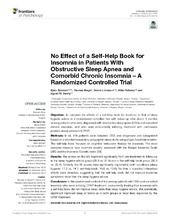| dc.contributor.author | Bjorvatn, Bjørn | en_US |
| dc.contributor.author | Berge, Thomas | en_US |
| dc.contributor.author | Lehmann, Sverre | en_US |
| dc.contributor.author | Pallesen, Ståle | en_US |
| dc.contributor.author | Saxvig, Ingvild W. | en_US |
| dc.date.accessioned | 2019-06-21T11:20:03Z | |
| dc.date.available | 2019-06-21T11:20:03Z | |
| dc.date.issued | 2018-11-29 | |
| dc.Published | Bjorvatn B, Berge T, Lehmann S, Pallesen S, Saxvig IW. No effect of a self-help book for insomnia in patients with obstructive sleep apnea and comorbid chronic insomnia – a randomized controlled trial.. Frontiers in Psychology. 2018;9:2413 | eng |
| dc.identifier.issn | 1664-1078 | |
| dc.identifier.uri | https://hdl.handle.net/1956/20335 | |
| dc.description.abstract | Objective: To compare the effects of a self-help book for insomnia to that of sleep hygiene advice in a randomized controlled trial with follow-up after about 3 months among patients who were diagnosed with obstructive sleep apnea (OSA) and comorbid chronic insomnia, and who were concurrently initiating treatment with continuous positive airway pressure (CPAP). Methods: In all, 164 patients were included. OSA was diagnosed and categorized based on a standard respiratory polygraphic sleep study using a type 3 portable monitor. The self-help book focused on cognitive behavioral therapy for insomnia. The main outcome measure was insomnia severity assessed with the Bergen Insomnia Scale (BIS) and the Insomnia Severity Index (ISI). Results: The scores on the BIS improved significantly from pre-treatment to follow-up in the sleep hygiene advice group (26.8 vs. 21.8) and in the self-help book group (26.3 vs. 22.4). Similarly, the ISI scores were significantly improved in both conditions (sleep hygiene: 17.0 vs. 14.1; self-help book: 16.6 vs. 13.6). No time × condition interaction effects were detected, suggesting that the self-help book did not improve insomnia symptoms more than the sleep hygiene advice. Conclusion: In this randomized controlled trial among patients with OSA and comorbid insomnia who were initiating CPAP treatment, concurrently treating their insomnia with a self-help book did not improve sleep more than sleep hygiene advice. The statistically significant improved sleep at follow-up in both groups is most likely explained by the CPAP treatment. | en_US |
| dc.language.iso | eng | eng |
| dc.publisher | Frontiers | eng |
| dc.rights | Attribution CC BY | eng |
| dc.rights.uri | http://creativecommons.org/licenses/by/4.0 | eng |
| dc.subject | OSA | eng |
| dc.subject | insomnia | eng |
| dc.subject | AHI | eng |
| dc.subject | cognitive behavioral therapy | eng |
| dc.subject | CBTi | eng |
| dc.subject | sleep apnoea | eng |
| dc.title | No effect of a self-help book for insomnia in patients with obstructive sleep apnea and comorbid chronic insomnia – a randomized controlled trial. | en_US |
| dc.type | Peer reviewed | |
| dc.type | Journal article | |
| dc.date.updated | 2019-01-24T10:50:00Z | |
| dc.description.version | publishedVersion | en_US |
| dc.rights.holder | Copyright 2018 The Author(s) | |
| dc.identifier.doi | https://doi.org/10.3389/fpsyg.2018.02413 | |
| dc.identifier.cristin | 1659991 | |
| dc.source.journal | Frontiers in Psychology | |

